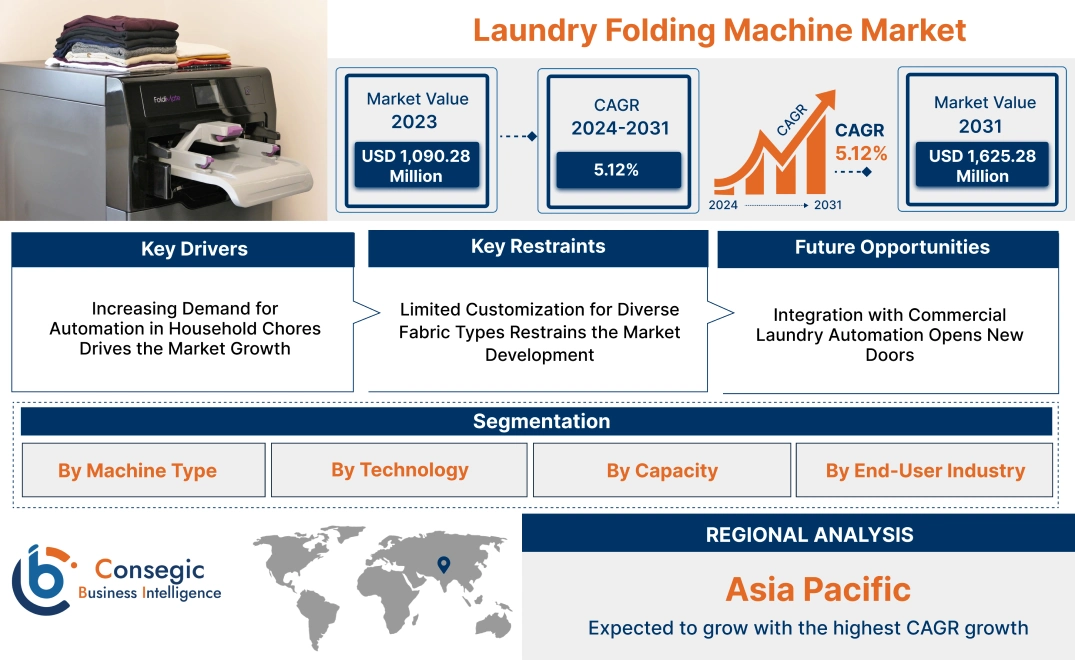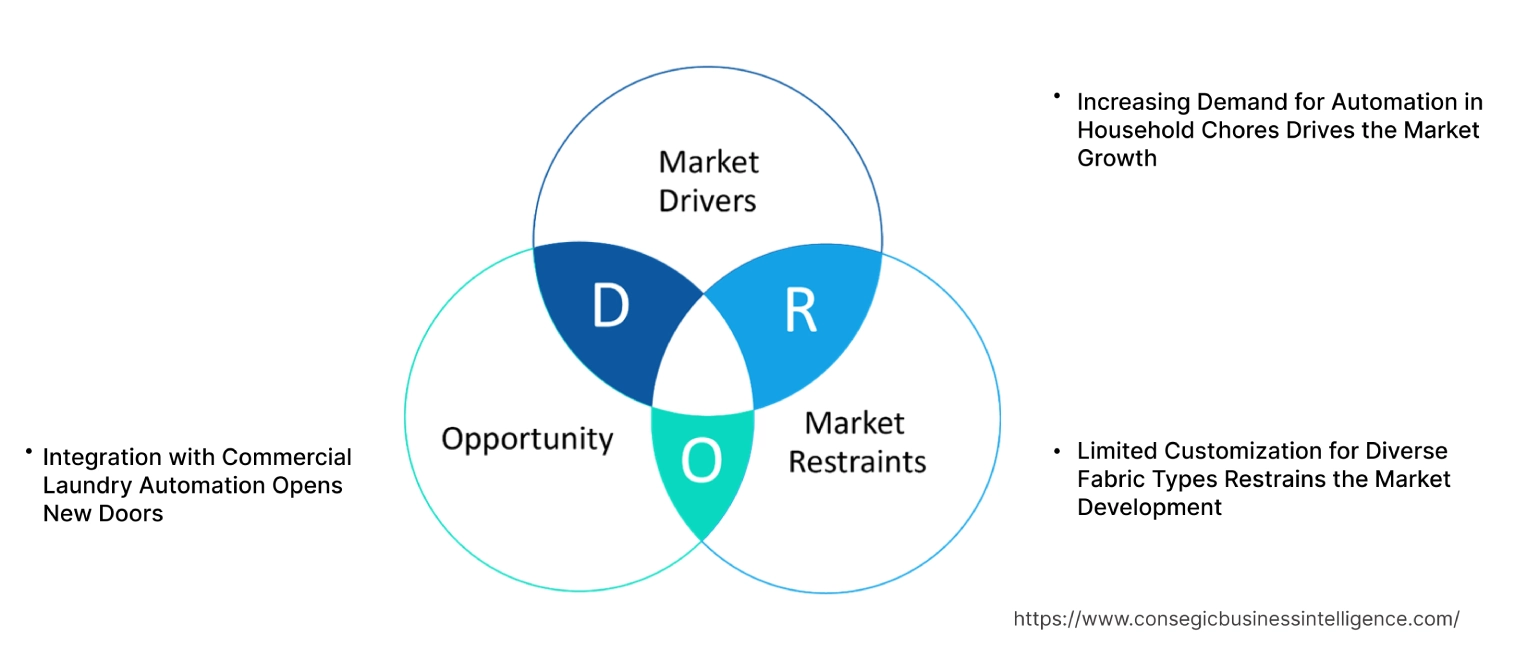- Summary
- Table Of Content
- Methodology
Laundry Folding Machine Market Size:
Laundry Folding Machine Market size is estimated to reach over USD 1,625.28 Million by 2031 from a value of USD 1,090.28 Million in 2023 and is projected to grow by USD 1,126.65 Million in 2024, growing at a CAGR of 5.12% from 2024 to 2031.
Laundry Folding Machine Market Scope & Overview:
A laundry folding machine is a device designed to efficiently fold clothes and textiles, streamlining the laundry process for both commercial and residential applications. These machines are engineered to handle a wide range of fabric types and sizes, providing consistent and precise folding results. They are widely used in settings such as laundromats, hotels, healthcare facilities, and households to save time and improve operational efficiency.
Laundry folding machines are available in various configurations, including compact models for personal use and larger industrial-grade systems for commercial purposes. Advanced models are equipped with features like customizable folding patterns, touch-screen interfaces, and fabric detection sensors, ensuring seamless operation and enhanced user convenience. Their ability to integrate with existing laundry systems further enhances their usability and adaptability.
End-users of laundry folding machines include hospitality businesses, hospitals, and laundry service providers, where automation is essential for managing large volumes of laundry efficiently. These machines play a crucial role in improving productivity and maintaining high standards in laundry operations.
Key Drivers:
Increasing Demand for Automation in Household Chores Drives the Market Growth
The increasing reliance on automation for household tasks is propelling the demand for advanced folding systems. As lifestyles grow busier, particularly among dual-income households and urban families, consumers are prioritizing solutions that simplify daily chores and save time. Laundry folding machines cater to this need by automating a traditionally time-intensive task, enhancing convenience and efficiency. Their integration into smart home ecosystems further amplifies their appeal, offering seamless control through IoT-enabled devices and voice commands. The trend aligns with the broader shift toward connected and automated home solutions, where technology enhances comfort and reduces manual effort. These systems not only offer functionality but also fit well into modern, compact living spaces, making them an ideal choice for urban households.
As a result, the adoption of these advanced systems is steadily growing, driven by the increasing emphasis on convenience and smart living. Thus, the aforementioned factors are driving the laundry folding machine market growth.
Key Restraints:
Limited Customization for Diverse Fabric Types Restrains the Market Development
Automated folding machines often struggle with diverse fabric types, particularly delicate materials like silk, heavily textured fabrics, or items with irregular shapes. These machines are typically designed to handle standard garments, which limits their ability to provide tailored folding solutions for non-standard or specialty items. Users who require precise handling for delicate or unique fabrics may find these systems inadequate, as improper folding can damage the material or compromise its appearance. Additionally, the lack of advanced customization options in folding settings poses a challenge for consumers who need personalized solutions for diverse laundry loads. This limitation is particularly pronounced in households or commercial settings, such as luxury hotels or boutiques, where maintaining the quality and integrity of fabrics is crucial. As a result, the restricted versatility in handling fabric types act as a deterrent, impacting the laundry folding machine market demand.
Future Opportunities :
Integration with Commercial Laundry Automation Opens New Doors
The integration of automated folding machines into comprehensive commercial laundry automation systems is revolutionizing industrial laundry operations. These machines seamlessly connect with washing, drying, and ironing units to create an efficient end-to-end process, reducing manual intervention and improving throughput. This approach is particularly beneficial in high-volume environments such as hotels, hospitals, and laundromats, where time efficiency and cost savings are critical. By streamlining folding tasks, businesses can achieve faster turnaround times while maintaining consistent quality, enhancing customer satisfaction.
Additionally, the trend aligns with the increasing demand for smart industrial solutions, enabling centralized monitoring and control of the entire laundry workflow. This integration not only optimizes resource utilization but also reduces labor costs, making it a valuable investment for commercial operators seeking to boost productivity. As industries continue to embrace automation, the adoption of folding machines as part of larger systems is expected to grow, driving laundry folding machine market opportunities.
Laundry Folding Machine Market Segmental Analysis :
By Machine Type:
Based on machine type, the market is segmented into automatic and semi-automatic machines.
Automatic machines accounted for the largest revenue of the total laundry folding machine market share in 2023.
- Automatic machines are designed to reduce human intervention and improve efficiency, making them ideal for high-volume laundry operations.
- These machines are widely used in commercial facilities, such as hotels and industrial laundry services, where speed and precision are crucial.
- Their advanced features, including programmable folding settings and automatic stacking, enhance productivity and operational consistency.
- As per the market analysis, the dominance of automatic machines is driven by increasing adoption across industries seeking to modernize their laundry processes and reduce labor dependency, fueling the laundry folding machine market expansion.
The Semi-automatic machines segment is expected to grow at the fastest CAGR during the forecast period.
- Semi-automatic machines offer a cost-effective solution for smaller facilities and businesses with moderate laundry requirements.
- These machines provide a balance between manual operation and automation, allowing for customized folding as per fabric type.
- Their flexibility makes them suitable for emerging markets and industries where affordability is a key consideration.
- As per laundry folding machine market analysis, rising requirement from small and medium enterprises (SMEs) is expected to support the growth of semi-automatic machines.
By Technology:
The market is segmented into robotic folding machines and manual-assisted folding machines.
The Robotic folding machines segment accounted for the largest revenue of the total laundry folding machine market share in 2023.
- Robotic folding machines use advanced sensors and machine learning algorithms to fold a wide range of fabrics and garments with precision.
- These machines are increasingly adopted in large-scale laundry operations where consistency and speed are critical.
- The dominance of this segment is driven by advancements in robotic technologies that enhance flexibility and efficiency in folding processes.
- As per the laundry folding machine market trends, industries such as hospitality and industrial laundry services prefer robotic solutions for their ability to handle diverse fabrics and complex folding tasks.
The Manual-assisted folding machines segment is expected to grow at the fastest CAGR during the forecast period.
- Manual-assisted machines offer a cost-effective solution for small-scale operations, particularly in emerging markets.
- These machines are preferred in facilities where human oversight is required to ensure customized folding for specialized garments.
- The segment’s growth is supported by their versatility in handling a variety of laundry items without requiring extensive technical knowledge.
- Therefore, the adoption is increasing in small and medium-sized enterprises (SMEs) that seek to balance automation with affordability, further driving the laundry folding machine market growth.
By Capacity:
The market is segmented based on capacity into small (up to 10 kg), medium (10-30 kg), and large (above 30 kg).
The Medium-capacity machines segment held the largest revenue of 39.30% share in 2023.
- Medium-capacity machines are widely used in facilities such as hotels, hospitals, and medium-scale laundry services for handling moderate laundry loads efficiently.
- These machines offer a balance between capacity and operational efficiency, making them suitable for diverse applications.
- The dominance of this segment is supported by rising adoption in industries that require high performance without the need for large-scale equipment.
- As per the laundry folding machine market analysis, features such as energy efficiency and enhanced durability further contribute to the popularity of medium-capacity machines.
The Large-capacity machines segment is expected to grow at the fastest CAGR during the forecast period.
- Large-capacity machines are essential for industrial-scale laundry operations, such as in healthcare facilities and large commercial laundry services.
- The segment’s growth is driven by increasing demand from sectors that handle high volumes of linens and garments daily.
- Innovations in machine design, such as multi-compartment loading and faster folding cycles, enhance their efficiency and appeal.
- Therefore, the adoption is fueled by growing investments in infrastructure expansion and automation in large-scale laundry facilities, boosting the laundry folding machine market demand.
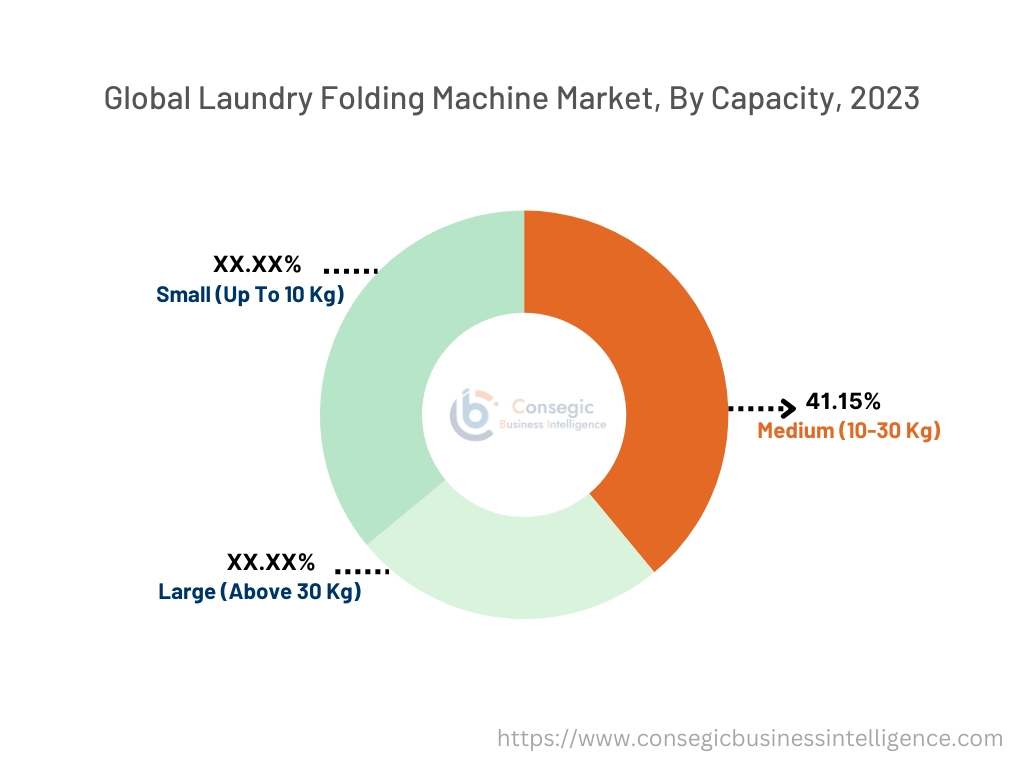
By End-User Industry:
The market is segmented into hotels and hospitality, healthcare, laundry services, and others.
The hotels and hospitality segment held the largest revenue share in 2023.
- Laundry folding machines are widely used in hotels to maintain high standards of linen presentation for guest services.
- The segment’s dominance is attributed to the continuous demand for efficient laundry solutions in the hospitality sector, where hygiene and aesthetics are paramount.
- Rising tourism and increasing numbers of luxury hotels globally further boost the adoption of folding machines in this sector.
- Thus, as per the market analysis, advanced folding machines tailored for handling large linens, such as bedsheets and tablecloths, enhance their usage in the hospitality industry, contributing to the laundry folding machine market expansion.
The healthcare segment is expected to grow at the fastest CAGR during the forecast period.
- Folding machines are increasingly adopted in hospitals and clinics to maintain strict hygiene standards for patient linens and uniforms.
- The segment’s growth is fueled by the need for automation in healthcare facilities to reduce manual handling and potential contamination.
- Rising investments in healthcare infrastructure globally support the adoption of advanced folding machines in this sector.
- Therefore, as per laundry folding machine market trends, features such as automatic disinfection and customizable folding settings enhance their appeal for healthcare applications.
Regional Analysis:
The regions covered are North America, Europe, Asia Pacific, the Middle East and Africa, and Latin America.
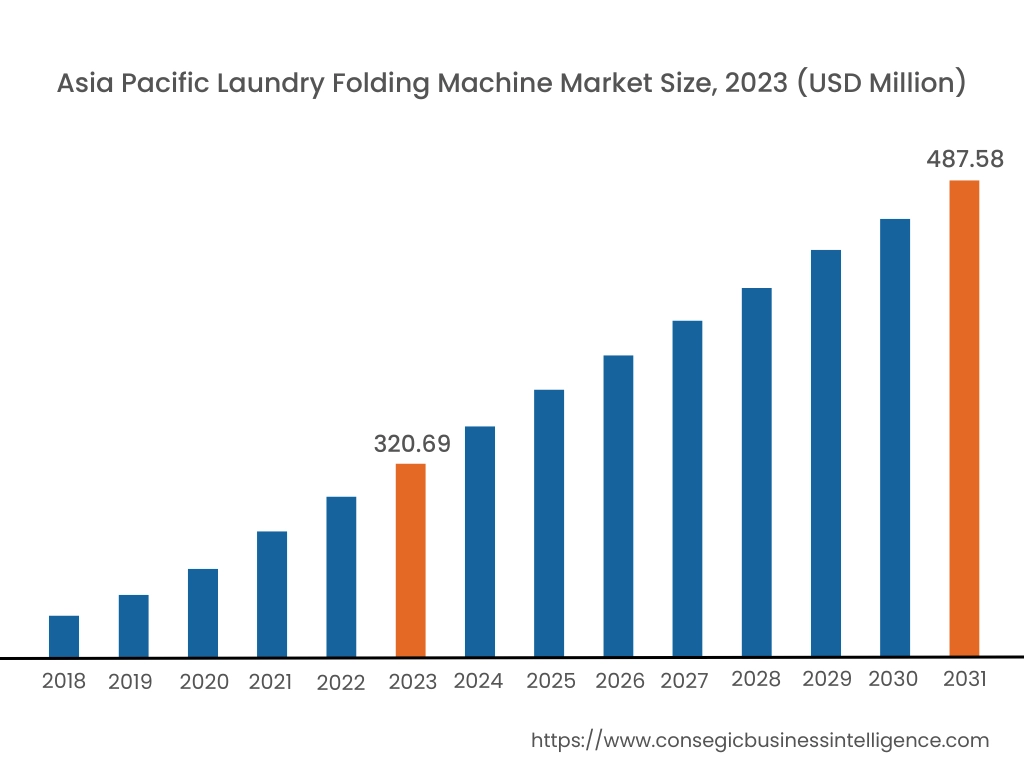
Asia Pacific region was valued at USD 320.69 Million in 2023. Moreover, it is projected to grow by USD 331.94 Million in 2024 and reach over USD 487.58 Million by 2031. Out of these, China accounted for the largest share of 28.4% in 2023. The Asia-Pacific region is experiencing rapid development in the laundry folding machine market, driven by increasing disposable incomes and urbanization in countries such as China, Japan, and South Korea. The proliferation of smart homes and the rising middle class have intensified the need for automated household appliances. Government initiatives promoting smart city projects further influence laundry folding machine market opportunities.
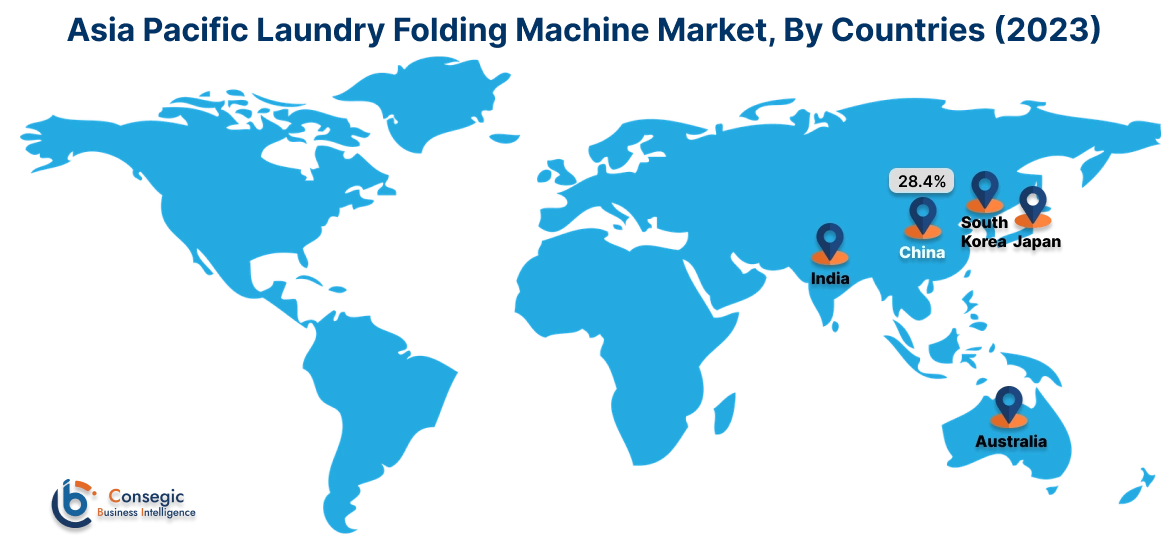
North America is estimated to reach over USD 534.72 Million by 2031 from a value of USD 362.40 Million in 2023 and is projected to grow by USD 374.17 Million in 2024. This region holds a significant share of the laundry folding machine market, driven by fast-paced lifestyles and a high standard of living. The United States, in particular, has seen extensive adoption of automated laundry solutions across residential and commercial sectors. A notable trend is the integration of smart technologies, such as IoT-enabled devices, allowing users to control and monitor folding machines remotely.
Europe represents a substantial portion of the global laundry folding machine market, with countries like Germany, France, and the United Kingdom leading in adoption and innovation. The region's emphasis on energy efficiency and sustainability has propelled the utilization of eco-friendly laundry solutions. Analysis indicates a growing trend towards compact and space-saving designs, catering to urban dwellers with limited space.
The Middle East & Africa region shows a growing interest in automated laundry solutions, particularly in the hospitality and healthcare sectors. Countries like the United Arab Emirates and South Africa are investing in advanced technologies to enhance operational efficiency. Analysis suggests an increasing trend towards adopting high-capacity folding machines to cater to large-scale laundry operations.
Latin America is an emerging market for laundry folding machines, with Brazil and Mexico being key contributors. The region's growing middle class and increasing interest in home automation have spurred the adoption of automated laundry solutions. Government policies aimed at modernizing infrastructure and enhancing digital capabilities influence market trends.
Top Key Players and Market Share Insights:
The Laundry Folding Machine market is highly competitive with major players providing products and services to the national and international markets. Key players are adopting several strategies in research and development (R&D), product innovation, and end-user launches to hold a strong position in the global Laundry Folding Machine market. Key players in the Laundry Folding Machine industry include –
- FoldiMate Inc. (USA)
- Ramsons Garment Finishing Equipment Pvt. Ltd. (India)
- Welco Garment Machinery Pvt. Ltd. (India)
- A.C. Holdings Co., Ltd. (Japan)
- Sunrise Garment Machinery Pvt. Ltd. (India)
- Consolidated Laundry Machinery (USA)
- Panasonic Corporation (Japan)
- BSH Home Appliances Corporation (USA)
- Sara Equipments (India)
Laundry Folding Machine Market Report Insights :
| Report Attributes | Report Details |
| Study Timeline | 2018-2031 |
| Market Size in 2031 | USD 1,625.28 Million |
| CAGR (2024-2031) | 5.12% |
| By Machine Type |
|
| By Technology |
|
| By Capacity |
|
| By End-User Industry |
|
| By Region |
|
| Key Players |
|
| North America | U.S. Canada Mexico |
| Europe | U.K. Germany France Spain Italy Russia Benelux Rest of Europe |
| APAC | China South Korea Japan India Australia ASEAN Rest of Asia-Pacific |
| Middle East and Africa | GCC Turkey South Africa Rest of MEA |
| LATAM | Brazil Argentina Chile Rest of LATAM |
| Report Coverage |
|
Key Questions Answered in the Report
How big is the Laundry Folding Machine Market? +
Laundry Folding Machine Market size is estimated to reach over USD 1,625.28 Million by 2031 from a value of USD 1,090.28 Million in 2023 and is projected to grow by USD 1,126.65 Million in 2024, growing at a CAGR of 5.12% from 2024 to 2031.
What specific segmentation details are covered in the Laundry Folding Machine Market report? +
The market is segmented into machine type (Automatic, Semi-Automatic), technology (Robotic Folding Machines, Manual-Assisted Folding Machines), capacity (Small Capacity (Up to 10 kg), Medium Capacity (10-30 kg), Large Capacity (Above 30 kg)), end-user industry (Hotels & Hospitality, Healthcare, Laundry Services, Others), and region (Asia-Pacific, Europe, North America, Latin America, Middle East & Africa).
Which is the fastest-growing segment in the Laundry Folding Machine Market? +
The healthcare segment is projected to grow at the fastest CAGR during the forecast period, driven by increasing demand for automated solutions in hospitals and healthcare facilities to maintain hygiene and improve operational efficiency.
Who are the major players in the Laundry Folding Machine Market? +
Major players in the Laundry Folding Machine Market include FoldiMate Inc. (USA), Ramsons Garment Finishing Equipment Pvt. Ltd. (India), Consolidated Laundry Machinery (USA), Panasonic Corporation (Japan), BSH Home Appliances Corporation (USA), Sara Equipments (India), Sunrise Garment Machinery Pvt. Ltd. (India), Welco Garment Machinery Pvt. Ltd. (India), Y.A.C. Holdings Co., Ltd. (Japan).
